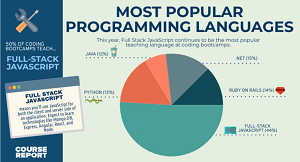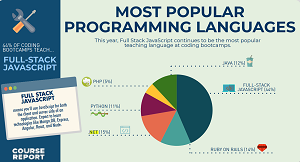News
.NET Ranks High in Coding Bootcamp Report
Microsoft's .NET development framework ranked high in recent research about coding bootcamps, or "immersive technology education."
With an average cost of about $14,000, these accelerated learning programs can last from six to 28 weeks -- averaging about 14 -- and promise to advance careers in both technical chops and bottom-line salary increases.
Course Report studies the industry and presents its findings in annual reports that can help coders pick the best option, among some 500 around the world, with the choice of programming language being a primary factor.
"Coding bootcamps employ teaching languages to introduce students to the world of programming," Course Report said in its latest study: Coding Bootcamps in 2021, an update of a 2020 report. "While language shouldn't be the main deciding factor when choosing a bootcamp, students may have specific career goals that guide them towards a particular language.
"In that case, first decide whether you'd prefer to learn web or mobile development. For the web, your main choices are Ruby, Python, LAMP stack, MEAN stack and .NET languages. For mobile, choose between Java for Android and Swift or Objective-C for iOS. Learning a specific language may lead you to a new job market and offer pathways to different career tracks, average salaries and areas of business. However, many recent bootcamp graduates find that they end up learning and using a completely different language on the job. There is no 'right' or 'wrong' language to learn!"
With that being said, its ranking of such languages shows .NET (basically C# since .NET isn't a language, but rather a framework), second in popularity only behind the ubiquitous JavaScript, which seems to dominate just about every development research report because of its heavy use in web programming.
Full-stack JavaScript was reportedly taught by 50 percent of bootcamps, with .NET coming in at 15 percent, tied with Python and ahead of Ruby on Rails (14 percent) and Java (12 percent) (the graphic below shows 44 percent for JavaScript, apparently not having been updated from last year's report):
 [Click on image for larger view.] Popular Bootcamp Languages (source: Course Report).
[Click on image for larger view.] Popular Bootcamp Languages (source: Course Report).
In last year's report, .NET had second place all to itself:
 [Click on image for larger view.] Popular Bootcamp Languages in 2020 Report (source: Course Report).
[Click on image for larger view.] Popular Bootcamp Languages in 2020 Report (source: Course Report).
"Full-Stack Web Development continues to dominate bootcamp curricula -- 90 percent of coding bootcamp grads learn Full-Stack Web Development," the 2021 report says. "Web Development coding bootcamps have historically been taught using Ruby on Rails, Full-Stack JavaScript, .NET/C#, Java, Python, or PHP. In 2020, Full-Stack JavaScript has maintained its position as the primary teaching language. 50 percent of courses reported Full-Stack JavaScript as the primary programming language. Not only are schools new to the market choosing JavaScript, but established bootcamps are also migrating their curricula to emphasize JavaScript."
As far as the favorite framework among, Visual Studio Magazine readers, the report links to a 2019 document titled Should you learn .NET at a Coding Bootcamp?
".NET is a framework rather than a language," the document explains. "The .NET language of choice to learn is C#, as it is among the most widely used languages today. It's a general purpose programming language that can handle almost any problem, from desktop to mobile to dynamic web applications.
"As such, there is a high demand across the United States (and certainly in the Southeast) for .NET developers in a variety of industries (computer systems design, electronic product manufacturing, finance, etc.), so that means that more jobs are available for candidates with a foundation built upon .NET technologies."
Other highlights of the 2021 report update include:
- Coding bootcamps are intensive, accelerated learning programs that teach beginners digital skills like Full-Stack Web Development, Data Science, Digital Marketing, UX/UI Design, Cybersecurity, and Technical Sales.
- The average bootcamp costs ~$14,000, and graduates report an average starting salary of $69,000. Bootcamps can vary in length from 6 to 28 weeks, although the average bootcamp is ~14 weeks long.
- Coding bootcamps teach modern, widely used programming languages and frameworks like Ruby on Rails, Python on Django, JavaScript, and PHP stacks through project-based learning. Students graduate from bootcamps with a portfolio, an online presence, interview skills and more. Most bootcamps help graduates find an internship or match students with an employer network – in fact, in Course Report's most recent research, 79 percent of bootcamp alumni report being employed in programming jobs.
-
There are bootcamp campuses in over 85 cities throughout the US/Canada, although many bootcamps moved online in response to the COVID-19 pandemic. Coding bootcamps are predicted to graduate 25,000 students and gross $350MM in tuition revenue in 2020.
The average bootcamper has 7 years of work experience, has at least a Bachelor's degree, and has never worked as a programmer. However, the number of students with degrees appears to be declining slightly over time.
About the Author
David Ramel is an editor and writer at Converge 360.